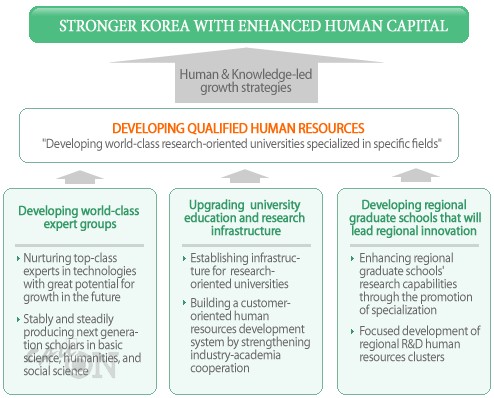
Brain Korea 21 (BK21) is a human resource nurturing system for competent students, which was executed by the Ministry of Education and Human Resources Development and Korea Research Foundation. Chung-Ang University also join and prepared for it, and has been chosen as a top representative case to promote student human resources among similar projects at other universities. According to data announced by the Ministry of Education and Human Resources Development on September 17, CAU has been selected in operation field six times. It is a remarkable result compared to results of Korea University and Hanyang University. CAU expects to be supported for the increased working expense through an annual evaluation.
Top an operation division Seoul University(14case), Chung-Ang University, Korea University, Hanyang University(6case), Sungkyunkwan University(5case), KAIST(4case), Yonsei University(3case), ewha woman University, Kyunghee University(2case).
Lowest an operation division Yonsei University(10case), Seoul University(7case), Hanyang University(7case), Kyunghee University(6case), Sungkyunkwan University(3case), KAIST(2case), Korea University(2case), Dongguk University(2case)
What is BrainKorea21?
To nurture top graduate schools and to foster excellent researchers, BrainKorea21 is a high-quality human resource nurturing program designed to aid the candidates for the master course, PhD and advanced-level researchers.
Why is brainkorea21 important?
Based on the achievements of the 1st phase, the 2nd phase of BK21 will further facilitate the introduction and establishment of systems for research-oriented universities.
BK 21 recognizes the necessity to develop Korea's human resources in key areas, such as core and original technologies, as well as new growth engines, which will drive economic growth in the future.
BK 21 provides financial support to graduate students, the next generation of scholars with creativity.

Objective
Since 2006, 20,000 graduate students, including Masters and PhD students, have been supported by BK 21 each year.
-Approximately 15,000 students/year from leading graduate schools including 5,500 from local graduate schools are offered financial assistance.
By the year 2012, 10 research-oriented universities with global competitiveness will be established and further developed.
-Korea aims to become one of world’s top ten countries in terms of the number of theories listed in Science Citation Index (SCI.) (Korea ranked 12th in 2005.)
By the year 2012, Korea wishes to become one of the top ten advanced countries in the world regarding knowledge translation from universities to industries. (Korea ranked 21st in 2005, according to IMD)
-Increased rate of technology transportation from university to private sector: 10% (2004) - 20% (2012)

